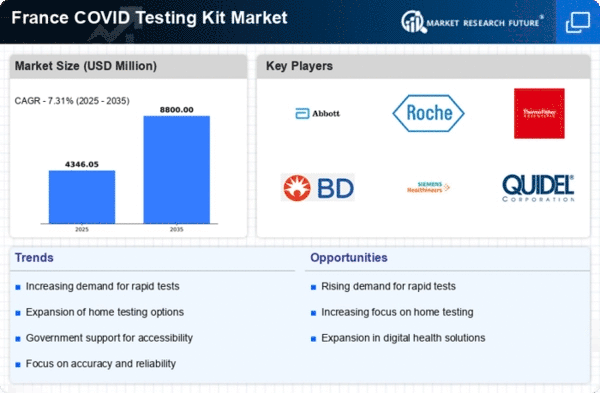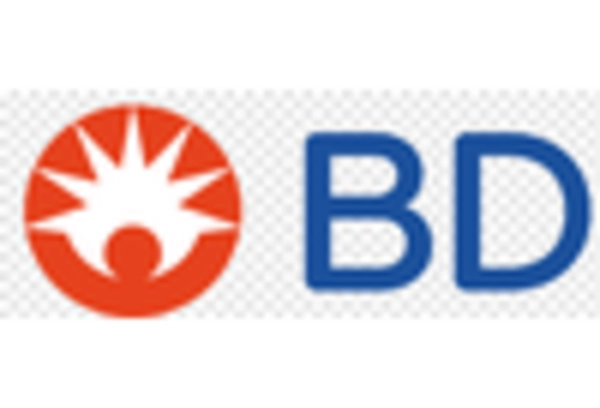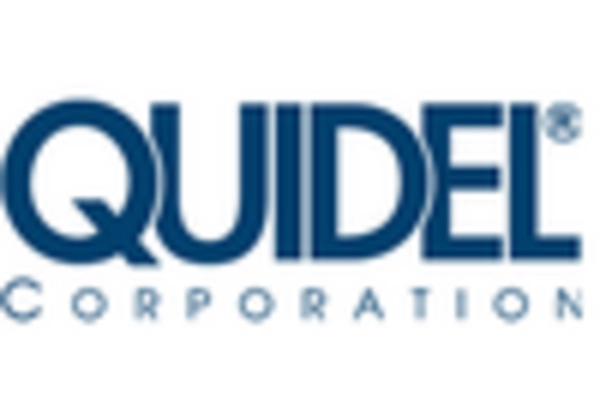Increased Public Awareness
The COVID testing-kit market in France is experiencing a notable boost due to heightened public awareness regarding the importance of testing. As citizens become more informed about the benefits of early detection, the demand for testing kits surges. This awareness is often driven by government campaigns and health organizations emphasizing the role of testing in controlling outbreaks. Consequently, the market sees a significant increase in sales, with estimates suggesting a growth rate of approximately 15% annually. The emphasis on personal responsibility in health management further propels the market, as individuals seek to ensure their safety and that of their communities. This trend indicates a shift towards proactive health measures, which is likely to sustain the market's growth trajectory in the coming years.
Government Initiatives and Funding
Government initiatives play a crucial role in shaping the covid testing-kit market in France. The French government has allocated substantial funding to enhance testing capabilities, which includes subsidies for testing kits and support for research and development. This financial backing is aimed at increasing accessibility and affordability of testing solutions for the population. Reports indicate that government spending in this sector has increased by over 20% in the last year, reflecting a commitment to public health. Such initiatives not only stimulate market growth but also encourage innovation among manufacturers, leading to the development of more efficient and user-friendly testing kits. The ongoing support from governmental bodies is likely to sustain momentum in the market, ensuring that testing remains a priority in public health strategies.
Rising Demand for Home Testing Kits
The market for COVID testing kits in France is experiencing a significant shift towards home testing solutions. As consumers seek convenience and privacy, the demand for at-home testing kits has surged. This trend is particularly pronounced among individuals who prefer to avoid crowded testing centers. Market data indicates that sales of home testing kits have increased by approximately 40% over the past year, reflecting a strong consumer preference for self-administered tests. This shift is likely to continue, as manufacturers respond by developing more user-friendly and accurate home testing options. The growing acceptance of home testing is expected to reshape the market landscape, potentially leading to a permanent change in consumer behavior regarding testing practices.
Emerging Variants and Health Concerns
The emergence of new variants of the virus continues to impact the covid testing-kit market in France. As variants arise, there is a corresponding increase in the demand for testing to monitor and control their spread. Health authorities recommend regular testing to identify infections early, which drives consumers to seek out testing kits. The market has seen fluctuations in demand, with spikes occurring during periods of heightened concern over new variants. This dynamic environment suggests that the market may experience continued volatility, with potential growth rates fluctuating between 10% to 25% depending on the public health situation. Manufacturers are thus incentivized to adapt their products to ensure efficacy against these variants, further influencing market trends.
Technological Integration in Testing Solutions
The integration of advanced technology into testing solutions is reshaping the covid testing-kit market in France. Innovations such as mobile testing applications and AI-driven analysis tools enhance the efficiency and accuracy of testing processes. These technological advancements not only improve user experience but also streamline the logistics of testing, making it more accessible to the public. The market is witnessing a shift towards digital solutions, with estimates indicating that tech-enhanced kits could capture up to 30% of the market share within the next few years. This trend suggests a growing consumer preference for convenience and reliability, compelling manufacturers to invest in research and development to stay competitive. The ongoing evolution of technology in this sector is likely to drive sustained growth in the market.
















